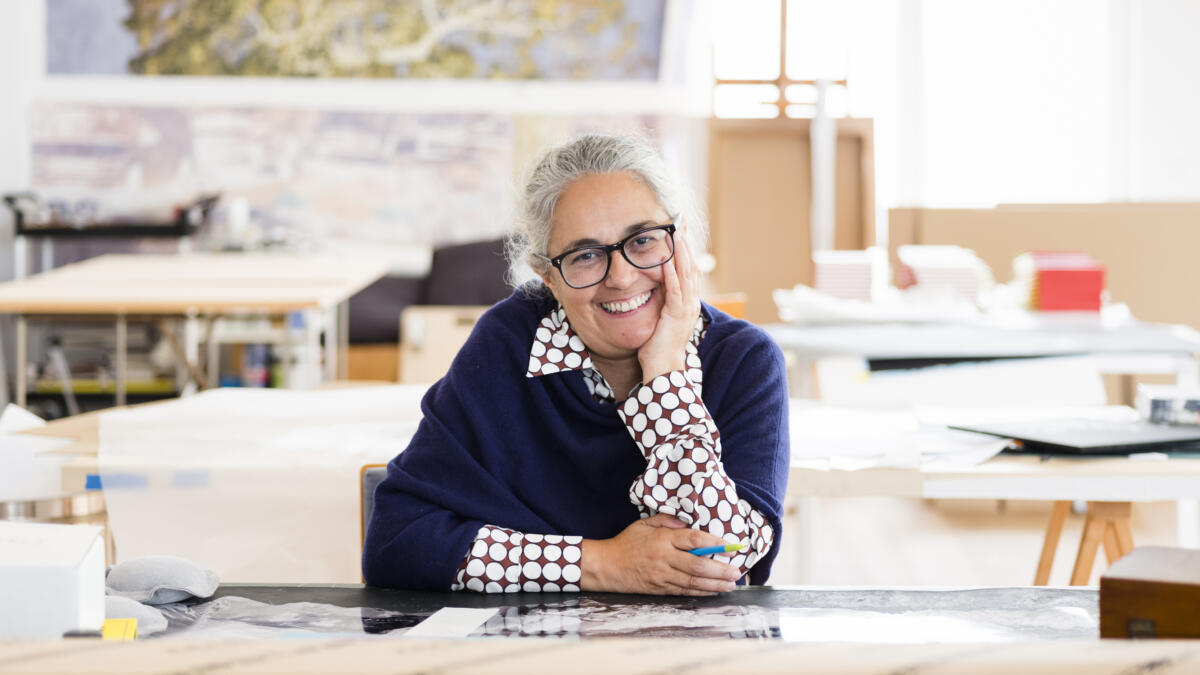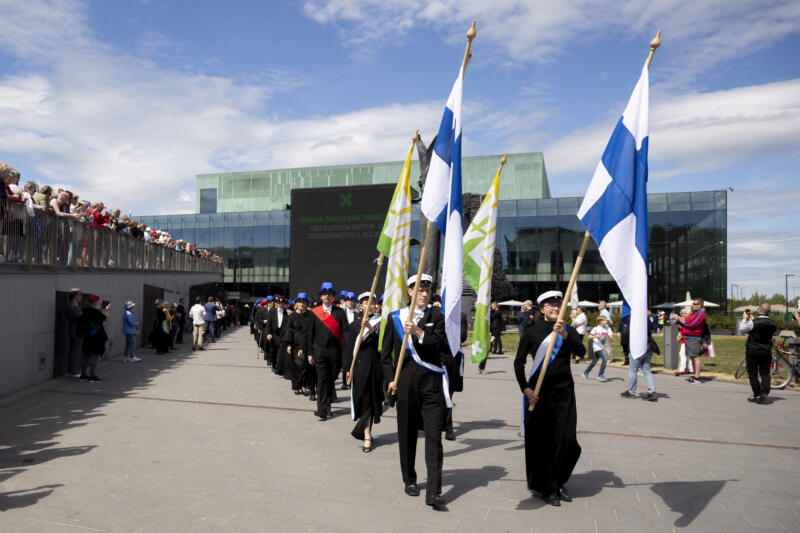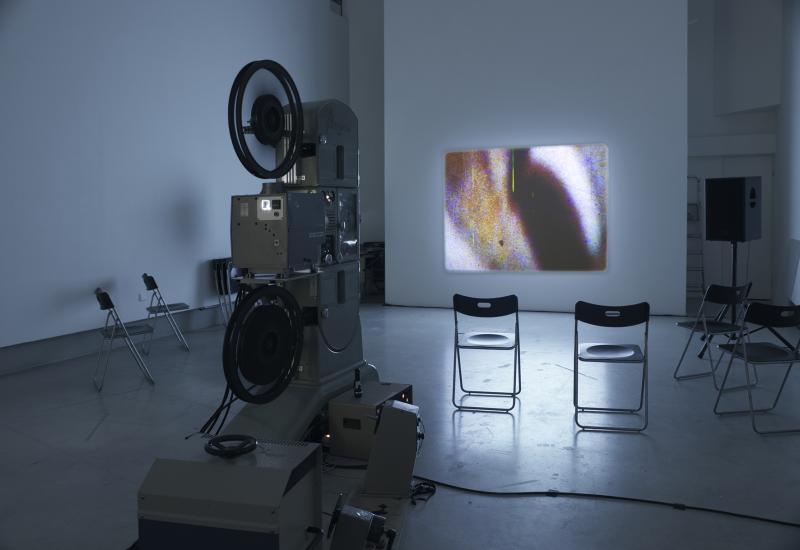Honorary doctor Tacita Dean: Analogue filming leaves room for happy accidents
Tacita Dean is one of the recipients of honorary doctorates at Uniarts Helsinki. The Academy of Fine Arts wanted to honour her for her internationally acclaimed work where she uses multiple art forms together with analogue film.

Tacita Dean (b. 1965) has always combined many art forms, mainly analogue film, words, drawings, collage and printmaking. In the 1980s, she studied at the department of painting at different art schools in the UK.
“During my studies, I was a dysfunctional painter and from early on I used paper instead of canvas. I often added words in my drawings and made them in series so it was perhaps inevitable I started working with film. I have not changed much at all since I was an undergraduate. What you see now, was there when I was still studying. The connection to what I do now is strong in both ideas and techniques,” Dean says.
She even showed some of her early drawings in her recent exhibition in MCA in Sydney, Australia. She saw how much they related to her recent film Geography Biography (2023) and thought it was interesting to exhibit them.
”Chance is present in everything I do. My films are effectively made inside the camera because of my masking technique, and I only see them when the negative is processed and printed. Sometimes there can be a great treasure, but sometimes it can all go wrong. This is how digital differs from film as you can see what you are doing at all times working digitally. Digital is like working with the lights turned on all the time. Whereas with analogue, everything is made in darkness. Things you did not intend are sometimes the best things. I am a believer in the unintended act,” Dean says.
She believes that accidents bring out the unknowable.
“Sometimes a flawed out of focus photograph of someone carries more of their essence than a correctly focused one. Film is a medium of time. It has this connection to memory. Memory is connected to longing.”
Time, memories and longing
Dean spends a lot of time thinking about sound because film is recorded without sound and sound is a separate construction, added later.
“Sound is a powerful tool. It describes the atmosphere of a place and time. I try to tap into memory by adding, for example, the sound of a distant moped on a summer night. A work of art only ever exists in the experience of the viewer and everyone’s memories are different. But sound can have a universal quality that can trigger memories for everyone.”
History is full of accidents with huge consequences.
“We need to study history, because that is the most important thing that makes us human. I am interested in time and how time is manifested. For example, in portraits that I have made of people, time is manifested in their bodies,” Dean says.
Sometimes Dean writes about her works.
“I call them asides. It is similar to when an actor speaks suddenly directly to the audience in a play without affecting the action on stage. My texts are not explanatory but anecdotal. They add to the work, they do not explain it.”
Pro analogue in a digital world
The Academy of Fine Arts of Uniarts Helsinki has a long tradition of film-based practice and they want to invest in research in analogue art. In January 2024, with the support of the Saastamoinen Foundation, the academy launched a research project that focuses on the meaning of analogue images in the era of digital image.
Dean finds this research emphasis interesting, since she wants to keep analogue film art alive through her work. She visited the Academy of Fine Arts briefly about 20 years ago as a visiting lecturer.
“I am touched by the honorary doctorate and very happy to be honoured by the Academy of Fine Arts. I think digital and analogue should exist side by side. At some point, I was afraid that photochemical photography and film were going to become extinct. However, now, hopefully, we are beginning to see what we experienced was just an eclipse, and that analogue film art is coming out on the other side. These days, I can see that many young artists are interested in analogue film and photography and the possibilities outside of the digital screen,” Dean says.
She points out that the history of film started with art rather than entertainment. The surrealists and the German expressionists were finding out what they could do with it.
“Film as an art form has always had one foot in entertainment, but I am not interested in that. I always stay within art. I have more freedom in art than I would as an independent filmmaker in the industry.”
Even if you could influence a bigger audience and the society at large?
“Artists should not think that they will influence someone. The viewers of the artwork have their own history and the artist does not know what they bring with them to the situation. If you try to influence them, you will lose your audience,” Dean says.
Art education has become utilitarian
She does not teach in art schools regularly, but sometimes she does short workshops.
“I used to do visiting lectures, but the absence of analogue teaching tools like a slide projector became tiresome. Even if I live in the modern world and I use computers and smartphones, my work is not digital. My finished work is an analogue object.”
Dean warmly remembers her own education at Falmouth College of Art and the Slade School of Art in London.
“Art education has changed a lot in the UK and not for the better. My education was wonderful. We were given the time and space to experiment and grow but now it is increasingly about money. The education is expensive and, sadly, in many art schools there is this utilitarian aspect coming through,” Dean says.
International career based in Berlin and LA
Tacita Dean’s career has been very international and she has had exhibitions all over the world. In 2020, Dean had a large exhibition at EMMA – Espoo Museum of Modern Art in Finland. A review of the exhibition in Finland’s biggest newspaper Helsingin Sanomat called Dean’s works astonishing. However, the exhibition opened at the worst possible time, in February 2020.
“I got great feedback on the opening day, but then came COVID-19 and no one could visit. I was in Helsinki with my son for the opening of the exhibition so I have strong memories of the beginning of the pandemic,” Dean says.
Dean has lived in Berlin for more than 20 years and she has bought a studio there. She also lives in Los Angeles. In January 2024 when the interview was conducted, Dean was just planning an exhibition of drawings in the Menil in Houston, Texas.
“I am much more invested in the art world in LA than in Berlin these days. I am going to LA this week and I hope I find some inspiration there. LA is good for the technical side of filmmaking and I often start hands-on and let technical things guide me,” Dean says.
Text: Päivi Brink
Uniarts Helsinki conferment event, the ceremonial conclusion of university studies, will be held in Helsinki from 16 to 18 August 2024. The ceremony will feature the conferment of degrees on master’s graduates and doctors from the university’s academies. Additionally, honorary doctorates will be conferred on eight individuals who represent Finnish or international pioneers and influential figures in their fields and who have advocated for arts education or advanced the societal role and significance of the arts.
The honorary doctors have been selected by the boards of the Academy of Fine Arts, Sibelius Academy and Theatre Academy and the university board of the University of the Arts Helsinki. Being conferred an honorary doctorate is the highest recognition bestowed by the university.

